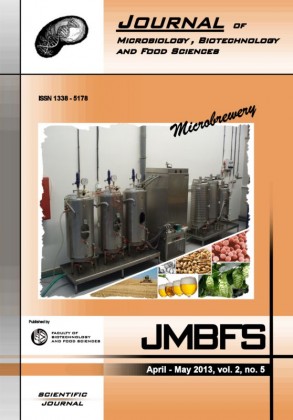CHARACTERIZATION OF THE PARTIALLY PURIFIED PLANTARCIN SR18 PRODUCED BY LACTOBACILLUS PLANTARUM SR18
Keywords:
Plantarcin, molecular weight, stability, dissociating agents, proteaseAbstract
The bacteriocin bound to the cells and that secreted into the culture filtrate of Lactobacillus plantarum SR18 were precipitated by 75% ammomium sulphate, dialysed and further purified by Gel filtration on Sephadex G-100. Bacteriocins were purified from proteins bound to the cell of L. plantarum SR18 (plantarcin SR18 a) and culture filtrate proteins (plantarcin SR18 b), respectively. The SDS-PAGE of partially purified Plantarcin SR18a showed a molecular weight of 3.5 KDa. While, plantarcin SR18 b had a molecular weight of 10.3 KDa. The antibacterial activity of the tested plantarcin SR18 preparations suffered no measurable loss after 45 min at 80ºC. Whereas, At 100ºC, significant decrease in the activity of bacteriocin preparations (60- 80 %) took place by the end of 45 min. At pH ranged from 5-8, the activity of the plantarcin SR18 preparations suffered no measurable loss. Dissociating agents significantly affected the bacteriocin activity. Thus, tween 80 and mercaptoethanol increased the activity of bacteriocin preparations to 1.2-1.4 fold. Sodium dodecyl sulphate (SDS) increased the activity of the tested bacteriocin preparations by about 20%.The lowest residual activity (60%) was recorded after treatment with Triton X100 for 45 min. Protease completely inhibited the activities of all forms of plantarcin SR18 after 45 min at 37ºC.Downloads
Download data is not yet available.
Downloads
Published
2013-04-01
How to Cite
El-Shouny, W., Abo-Kamar, A., & Ragy, S. (2013). CHARACTERIZATION OF THE PARTIALLY PURIFIED PLANTARCIN SR18 PRODUCED BY LACTOBACILLUS PLANTARUM SR18. Journal of Microbiology, Biotechnology and Food Sciences, 2(5), 2301–2305. Retrieved from https://office2.jmbfs.org/index.php/JMBFS/article/view/7112
Issue
Section
Microbiology
License
Copyright (c) 2013 Wagih El-Shouny, Amal Abo-Kamar, Suzan Ragy

This work is licensed under a Creative Commons Attribution 4.0 International License.
All papers published in the Journal of Microbiology, Biotechnology and Food Sciences are published under a CC-BY licence (CC-BY 4.0). Published materials can be shared (copy and redistribute the material in any medium or format) and adapted (remix, transform, and build upon the material for any purpose, even commercially) with specifying the author(s).

